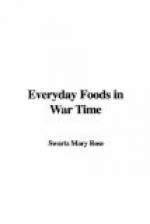A good dish of oatmeal is as creditable a product as a good loaf of bread. It cannot be made without taking pains to get the right proportions of meal, water, and salt, and to cook thoroughly, which means at least four hours in a double boiler, over night in a fireless cooker, or half an hour at twenty pounds in a pressure cooker. Half-cooked oatmeal is most unwholesome, as well as unpalatable. It is part of our patriotic duty not to give so useful a food a bad reputation.
The man who does hard physical labor, especially in the open air, may complain that the oatmeal breakfast does not “stay by” him. This is because it digests rapidly. What he needs is a little fat stirred into the mush before it is sent to the table, or butter as well as milk and sugar served with it. If one must economize, the cereal breakfast should always be the rule. It is impossible in any other way to provide for a family adequately on a small sum, especially where there are growing children.
Next to oatmeal, hominy is one of the cheapest breakfast foods. It has less flavor and is improved by the addition of a few dates cut into quarters or some small stewed seedless raisins, which also add the iron which hominy lacks. For the adults of the family the staying qualities of hominy and cornmeal can be increased by cutting the molded mush in slices and frying till a crisp crust is formed. This can be obtained more easily if the cereals are cooked in a mixture of milk and water instead of water alone. The milk supplements the cereal as acceptably as in a dish of mush and milk. Cornmeal needs even more cooking than oatmeal to develop an agreeable flavor. It can be improved by the addition of an equal amount of farina or cream of wheat.
Cereals for dinner are acceptable substitutes for such vegetables as potatoes, both for economy and for variety. The whole grains, rice, barley, and hominy, lend themselves best to such use. Try a dish of creamed salmon with a border of barley; one of hominy surrounded by fried apples; or a bowl of rice heaped with bananas baked to a turn and removed from their skins just before serving, and be glad that the war has stirred you out of food ruts!
Cereals combined with milk make most wholesome puddings, each almost a well-balanced meal in itself. They are easier to make than pies, shortcakes, and other desserts which require wheat flour, and they are splendid growing food for boys and girls.
For the hard-working man who misses the slowly-digesting pie, serve the puddings with a hard sauce or add a little butter when making them. For the growing children, raisins, dates, and other fruits are welcome additions on account of their iron. From half a cupful to a cupful of almost any cereal pudding made with milk is the equivalent of an ordinary serving of pie.
Aside from the avoidance of actual waste of food materials, there seems to be no one service so imperative for housewives to render in these critical times as the mastery of the art of using cereals. These must be made to save not only wheat but meat, and for most of us also money.




